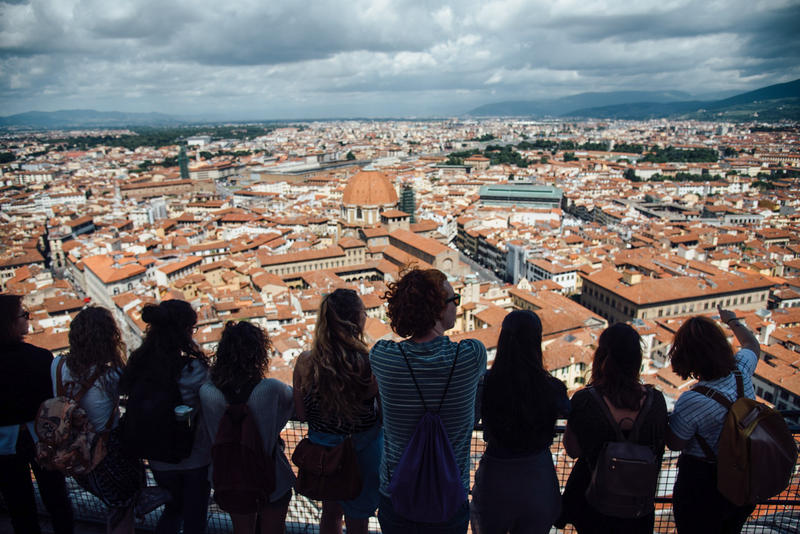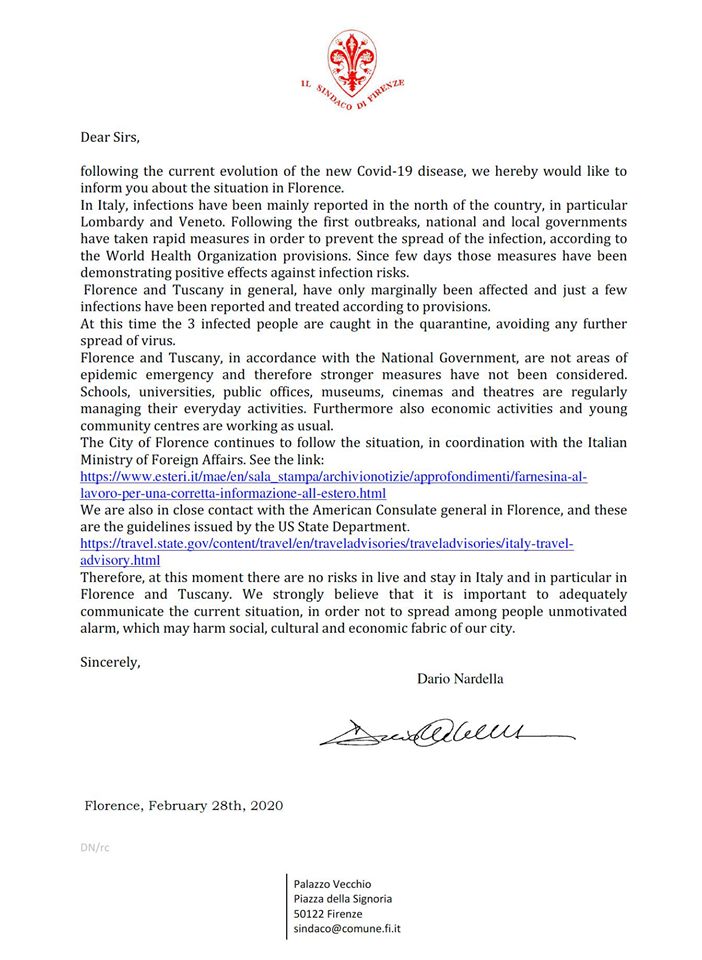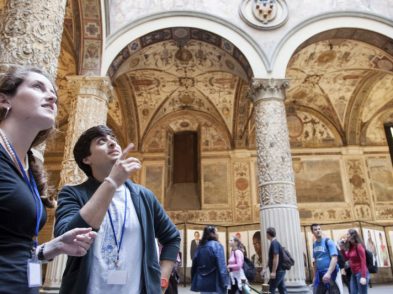This past week, the study abroad experience of most American college students in Florence came to an abrupt end as, with tearful hugs for their homestay moms and waving arrivederci to favorite baristas, they were told to return home due to concerns surrounding the current Coronavirus, Covid-19. The move was prompted by the introduction of a “Level 3, Avoid Nonessential Travel” to Italy advisory by the US’s Centers for Disease Control and Prevention (plus a “Level 4, Do Not Travel to Lombardy and Veneto). As a result, many American programs in Florence and Tuscany have closed (or are continuing tuition remotely), sending circa 15,000 students back to the United States.

Amid coronavirus concern, Study Abroad programs in Italy are suspending classes, returning students to U.S. / Ph. Harding University
Although it is too early to assess the total extent of the financial impact of this exodus, certain preliminary estimates can already be made. Matteo Duni, president of ASAUI (Association of Scholars at American Universities in Italy) points out that, although most universities will continue their currently running courses by means of online teaching, the impact will extend well beyond the spring semester.
“The summer semester may be fully compromised by this point. The big question, however, is the fall 2020 semester. Deadlines for registration are typically mid-March. Even if the deadline is extended until mid-April, how many parents will want to commit to sending their children here if they feel there might still be a threat?”
When asked how many jobs might be endangered by a dramatic drop in enrollment, Duni responded: “A few hundred faculty will almost certainly not have their contracts renewed. And there is also the question of auxiliary staff, a hundred or so individuals, who lead field trips and other activities. This is not to mention the loss of income to restaurants, pubs or host families. As the impact on the local economy of study abroad in Tuscany amounts to approximately 200 million euro a year, we are talking about tens of millions lost just for the summer semester alone.”
Of course, the primary concern in evacuating students was their safety and return to the US without quarantine, not the economic bottom line. But for most in Florence, the question remains as to whether the decision to withdraw all these students from Tuscany was justified. Matteo Duni, for one, rejects the idea of a health risk in Tuscany.
“The local community here knows there is no major threat,” says Duni, citing an open letter written by Florence Mayor Dario Nardella to American schools in the US. In this missive, in English, on February 28, the Mayor declared that “Florence and Tuscany, in accordance with the National Government, are not areas of epidemic emergency […] At this moment there are no risks in live and stay in Italy and in particular in Florence and Tuscany.”

Unlike its American counterparts, The British Institute of Florence has decided to continue its educational programs and cultural activities, notifying members by email this week that it will “remain open and remain operating normally.” The decision was made, the email continues, “following the guidelines and instructions issued by the national and local government officials. The latest assessment of the Protezione Civile and the Regione Toscana is that Tuscany is not considered a centre of coronavirus infection. Consequently no emergency measures have been taken. Museums, cinemas, theatres are open, all public transport is running regularly and schools have been ordered to stay open.”
The decision to withdraw students, made by college administrators in the United States, is viewed by many here as misguided.

NYU students in Florence
“Having worked in study abroad in Florence for 20 years, first in an administrative role and now as faculty, I recognize that liability is at the forefront of these institutions’ minds. I can appreciate the fact that contractually they are required to adhere to travel and emergency guidelines issued by the US government; however, I do feel that in this case there was an extreme overreaction on the part of some university programs to evacuate immediately, before really understanding the risks presented by allowing students to stay in Florence,” says Alexandra Lawrence, lecturer in the humanities at several American university programs.
In the meantime, many faculty members, as they scramble to adapt their present courses to online format, are uneasy, both for their students and themselves.
Laura Fenelli, who teaches art history at Kent State and Richmond College comments: “My first concern is my students: they were in the middle of a life-changing experience, and they were abruptly forced to return to the States. And then of course there is my job. I teach art history and my classes are mostly onsite. This is what makes the students come to Florence: they can study art history in the place where it happened.”
Many instructors feel under stress.
“To finish up the present term, our workload has increased tremendously, preparing course materials and lessons online,” says Anna Kraczyna, who teaches four language courses at a study abroad institution in Florence. “But much more serious is the question of whether or not there will be work in coming summer and fall semesters, or perhaps even in spring 2021.”
Marco Bracci, who teaches sociology courses at Richmond College and for the University of Minnesota at the Accent Center, expresses similar concern about the future. “I am very worried about unfortunate consequences that this situation will have on my professional future.” He refers to a “surreal situation,” in which he “will no longer be able to see the students from the spring semester,” with whom he interacted daily, although he is determined to continue teaching with the same dedication as before.
Given that the health risk here is low, in contrast to the way it has been represented in the foreign and local media, Duni calls upon everyone in the Italian political sphere to counter the negative image of Italy that has been spread abroad.
“Let’s not spread panic,” says Natalia Piombino, who teaches history at New York University, Syracuse University and Florida State. “Provided that our major concern is public health, let’s try to take a rational and responsible approach, and confront this situation together.”
Read the following statements from education programs in Florence:








